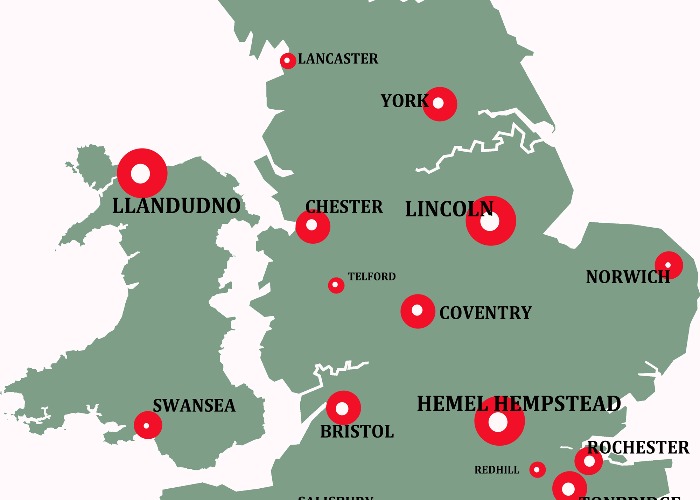Scam hotspots revealed: do you live in one of them?

Here are the 20 English and Welsh towns where you're likely to lose the most cash to scammers.
People who fall victim to scams tend to lose an average of £2,500, according to new data from Citizen's Advice.
The organisation has compiled a list of 20 areas where victims are likely to lose the largest sums of money to fraudsters.
Hemel Hempstead in Hertfordshire topped the list, with the typical victim losing a staggering £9,036.
This is followed by Exeter, where losses were around £5,736 per person.
Llandudno, which saw each victim lose an average of £5,501 is third, followed by Lincoln with £4,567.
Citizen's Advice gathered its data by examining 5,000 calls from victims across England and Wales.

Types of scams
The most common scam methods identified were up-front payments – where people were asked to pay for a service that never materialised – and fake services, including scammers telling victims their computer has a virus, which they can fix remotely.
Others were targeted with vishing scams, where scammers cold-call and attempt to get people’s bank details.
The findings were revealed as part of Scams Awareness month, a national campaign run by Citizen's Advice and Trading Standards to help people avoid falling prey to scams.
Commenting on the findings, Gillian Guy, chief executive of Citizen's Advice, said con-artists are using different tricks to rob people up and down the country.
“Some areas are suffering a blight of cold-calls about computer viruses, while others are bombarded with letters about lottery winnings which actually cost the victim money,” she said.
“If you think you may have lost money to a fraudster, seek advice straight away so you can try and get your money back. Reporting scams is the only way to stop scams from spreading, and get them closed down for good.”
How to protect yourself
Here are some tips on how to avoid this being conned out of your money through a phone scam:
- Be wary of unsolicited phone calls and especially cold callers who suggest you hang up and call them back. Fraudsters can keep your phone line open by not putting down the receiver at their end.
- If you feel something is suspicious, hang up, wait five minutes to clear the line, or where possible use a different phone line to call your bank or card issuer on their advertised number.
- If you don’t have another telephone to use, call someone you know first to make sure the telephone line is free.
- Remember your bank will never ask you to check the number showing on your telephone display matches their registered telephone number. The display can’t be trusted.
- Bear in mind criminals may already have basic information about you, like your name, address and account details, so don’t assume a caller is genuine based on these.
- Never tell anyone, including the bank or police, your four-digit PIN, your password or online banking codes and any personal detail unless you are sure who you are talking to.
It’s also important to remember that your bank and the police will never:
- Ask for your four-digit card PIN or online banking password, even by tapping them into the telephone keypad.
- Ask you to withdraw money to hand over for safekeeping.
- Ask you to transfer money to a new account for fraud reasons, even if they say it is in your name.
- Send someone to collect your cash, PIN, payment card or cheque book if you are a victim of fraud.
- Ask you to purchase goods using your card and then hand them over for safe-keeping
If you fall victim to fraud or even if you’re unsure contact your bank and tell them what has happened. You should report the crime to the police through Action Fraud by calling 0300 123 2040.
More on loveMONEY:
Comments
Be the first to comment
Do you want to comment on this article? You need to be signed in for this feature